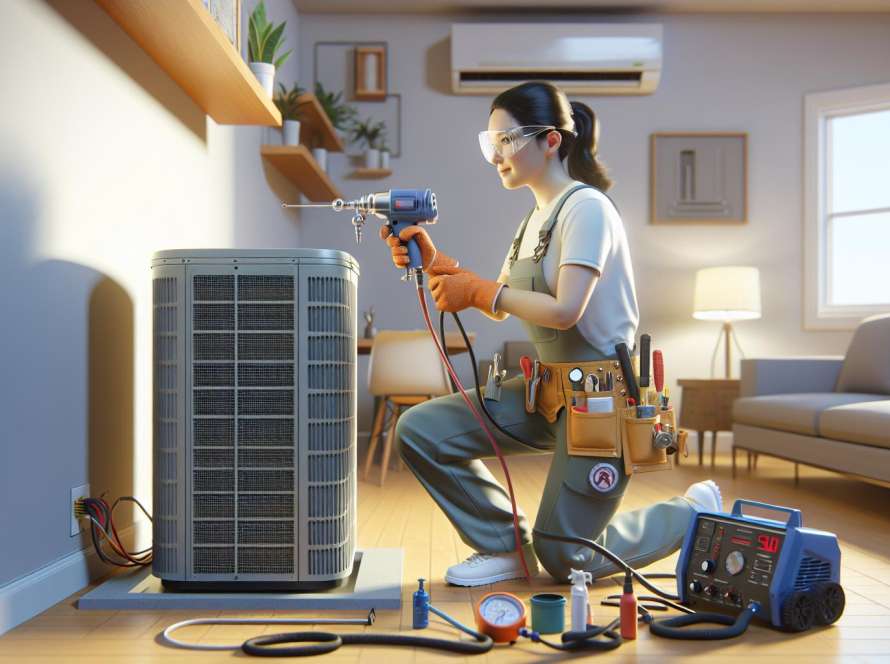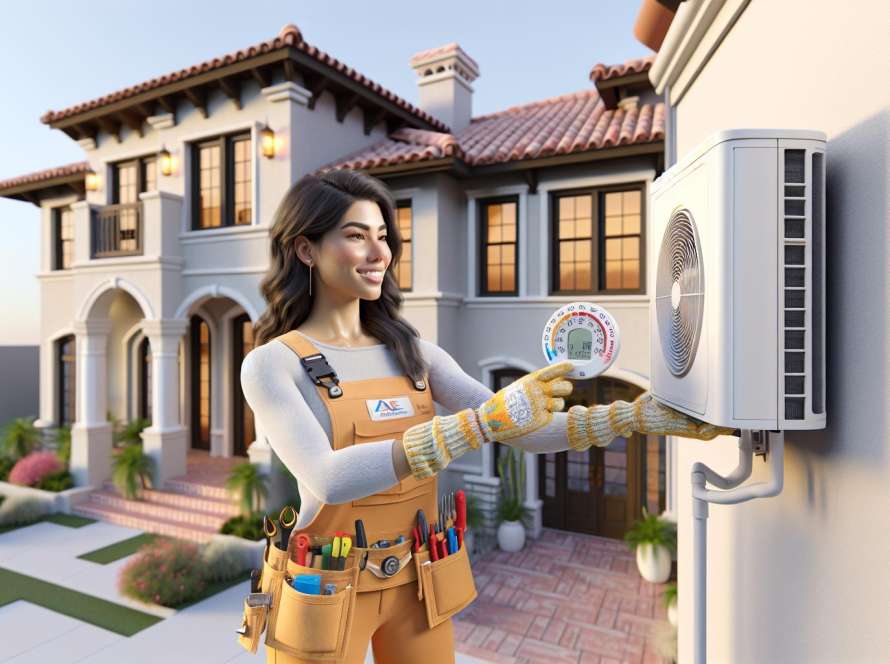Living by the coast has its perks, but it can also take a toll on our beloved AC systems. The salty air that brings a refreshing breeze can also bring corrosion and damage to our cooling units. At [Our Company], we understand the impact of salt air on AC performance and are here to guide you through it.
In this comprehensive guide, we’ll delve into the effects of salt air on your AC system and provide you with expert tips on how to maintain and protect your unit. From preventive maintenance to cleaning techniques, we’ve got you covered. Let’s ensure that your AC continues to keep you cool and comfortable, even in the face of salty challenges.
Understanding the Impact of Salt Air on AC Performance
Navigating the effects of salt air on your AC system can be crucial to ensuring its longevity and efficiency. Here, we delve into how salt air can impact your AC performance and offer insights for maintaining optimal functionality.
For Maintenance Beginners: Basics of Salt Air AC Care
- Inspect Regularly: Check for corrosion on AC components.
- Clean Filters: Replace or clean filters frequently to prevent blockages.
- Schedule Inspections: Arrange professional inspections for thorough assessments.
For Seasoned Homeowners: Enhancing AC Resilience
- Coil Cleaning: Regularly clean AC coils to prevent corrosion.
- Protective Coatings: Consider applying protective coatings to AC units.
- Invest in Maintenance Plans: Enroll in maintenance plans for expert care.
- Anti-Corrosion Treatments: Implement professional anti-corrosion treatments.
- Advanced Filtration Systems: Upgrade to advanced filtration systems for added protection.
- Corrosion-Resistant Materials: Opt for corrosion-resistant materials in AC units.
Whether you’re new to AC maintenance or a seasoned pro, understanding the impact of salt air on your system is key to preserving its performance and efficiency. Embrace these tips to keep your AC running smoothly amidst salty air challenges.
Common AC Components Affected by Salt Air

When it comes to AC units in salty air environments, there are specific components that are prone to corrosion due to the high salt content. Being aware of these vulnerable parts can help you take proactive measures to protect your AC system. Here’s a breakdown of common AC components affected by salt air, along with tips for maintenance:
For Beginners: Identifying Key Components
- Outdoor Condenser Coils: Prone to corrosion from salt exposure.
- Aluminum Fins: Vulnerable to oxidation in salty air.
- Electrical Contacts: Susceptible to short circuits due to salt accumulation.
For Intermediate Homeowners: Maintenance Guidelines
- Regular Cleaning: Use a gentle cleanser to remove salt residue.
- Corrosion Inhibitors: Apply a protective coating to sensitive components.
- Professional Inspections: Schedule annual maintenance checks to catch early signs of corrosion.
- Coil Coatings: Opt for epoxy coatings to enhance corrosion resistance.
- Galvanized Parts: Replace susceptible parts with galvanized alternatives.
- Dehumidification Systems: Install dehumidifiers to reduce moisture in the air, limiting salt exposure.
By understanding the impact of salt air on these AC components and implementing appropriate maintenance measures, you can extend the lifespan of your AC unit and optimize its performance in salty air environments.
Signs of Salt Air Damage on Your AC System
When it comes to salt air damage on your AC system, it’s essential to be vigilant and recognize the early signs to prevent extensive issues. Here’s a breakdown of what to look out for at various levels of experience:
For Beginners: Identifying Common Indicators
- Visible Corrosion: Keep an eye out for rust or corrosion on metal components like condenser coils or aluminum fins.
- Reduced Cooling Performance: Notice any inefficiency or inconsistent cooling as it could indicate underlying damage.
- Electrical Malfunctions: Be cautious of electrical issues like short circuits or frequent tripping.
For Intermediate Users: Digging Deeper
- Pitting or Flaking: Check for pitting or flaking on surfaces as these are signs of advanced corrosion.
- Foul Odors: Pay attention to any musty or strange smells coming from the AC unit, which could indicate mold growth from moisture.
- Water Leaks: Monitor for leaks or drips around the system, often caused by corroded or damaged components.
- Irreversible Damage: Be alert to extensive corrosion that may lead to permanent damage if not addressed promptly.
- System Overheating: Watch for frequent overheating or system shutdowns that suggest severe corrosion affecting heat dissipation.
- Localized Corrosion: Identify specific areas prone to localized corrosion such as electrical contacts or sensitive electronics.
Stay proactive in monitoring your AC system for these key indicators of salt air damage to ensure optimal performance and longevity.
Tips for Maintaining Your AC in Coastal Areas
For Beginners: Understanding the Basics
- Regular Cleaning: Start by cleaning the exterior and interior coils of your AC unit to prevent salt build-up that can lead to corrosion.
- Changing Filters: Remember to replace filters regularly to maintain proper airflow and efficiency.
- Checking for Leaks: Keep an eye out for water leaks which may indicate damage that needs immediate attention.
For Intermediate Users: Enhancing Performance
- Coil Coating: Consider applying a protective coating to the coils to create a barrier against salt air and corrosion.
- Professional Inspections: Schedule annual inspections with a qualified technician to detect and address any potential issues early on.
- Investing in Dehumidifiers: Use dehumidifiers in addition to your AC to reduce moisture levels and prevent corrosion.
- Corrosion Resistance: Opt for AC units with corrosion-resistant materials specifically designed for coastal environments.
- Regular Servicing: Implement a comprehensive maintenance schedule to include thorough cleanings and component checks.
- Monitoring Performance: Utilize smart thermostats and monitoring systems to track performance metrics and identify any deviations.
| Fact | Statistics |
|---|---|
| Average Lifespan of AC Unit in Coastal Areas | 10-15 years |
| Percentage Increase in Corrosion Risk in Coastal Zones | 60% |
| Recommended Frequency of Filter Replacement | Every 1-3 months |
Maintaining your AC in coastal areas requires proactive care and attention to combat the corrosive effects of salt air, ensuring optimal performance and longevity for your unit.
Conclusion
In coastal areas, salt air can significantly impact the performance of air conditioning units. By following the tips provided in this guide, we can proactively maintain our AC units to combat corrosion and ensure longevity and efficiency. From cleaning coils to scheduling professional inspections, implementing protective coatings, and using smart technology for monitoring performance, there are various strategies available for users at different levels. Remember, regular servicing, corrosion-resistant materials, and proper maintenance are key to extending the lifespan of your AC unit in coastal regions. Stay ahead of salt air effects by adopting these proactive measures and enjoy a cooler and more efficient indoor environment.

